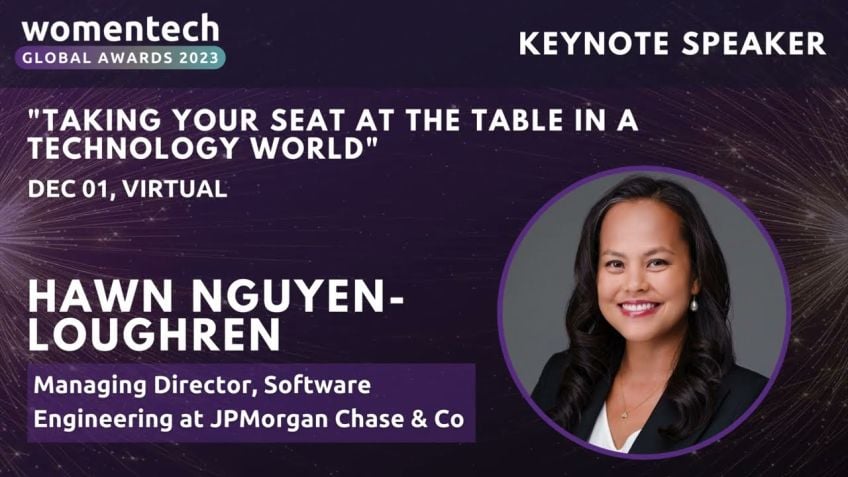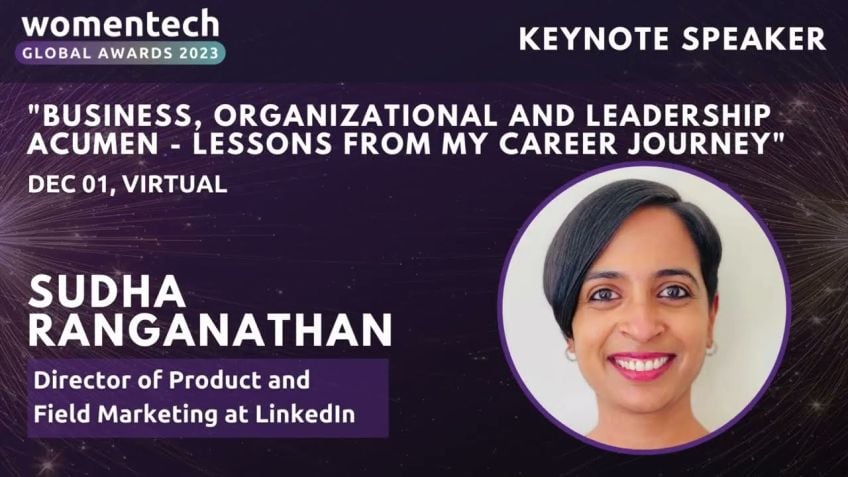Yes you can become a technical leader even if you haven't coded in forever by Beckie Riss
Beckie Riss
Principal Enterprise ArchitectBecoming a Technical Leader: Insights from Becky, Principal Enterprise Architect at Ford Motor Company
Welcome to our enlightening session with Becky, the Principal Enterprise Architect of Ford Motor Company. With over two decades of both domestic and international experience in the technology sector, Becky shares her journey to becoming a technical leader. In this blog, you will find useful tips, practices, and resources she used along her path.
The Journey to Becoming a Technical Leader
Through her journey at Ford Motor Company, Becky rose up the ranks to become a principal enterprise architect. Interestingly, her last assignment as a coder was way back in 1996. Despite the huge changes in technology practices since then, she found herself with 29 years of experience, holding a senior tech leadership position at one of the largest automotive companies worldwide.
Her experience has taught her that there's a big shift within companies seeking leaders in technical roles. As she navigated her career trajectory, Becky spent a significant amount of time investing in her own skills and development. She encourages women in technology to remain true to their authentic self and take paths that might initially seem intimidating.
Tapping into the Power of Mentorship
While sharing her experience with mentorship, Becky remarked on the power of multiple perspectives. By having a range of mentors, she received different perspectives that helped her grow. These mentors provided clarity in areas beyond just her performance review, giving her a safe space to experiment and practice her technical skills with confidence.
What's the key to finding the right mentor? Start by identifying someone whose style you admire and aspire to emulate. From there, request a meeting to discuss your career and take it one step at a time.
Learning to Be Vocal and Showcasing Your Aptitude
Becky found that in order to be perceived as a technical leader, one needs to showcase their aptitude, leading with voicing views and asking questions. Through her journey, she forced herself to ask a question in every meeting she attended. She realized that her questions were often shared by others, thus acknowledging shared silences while also being viewed as proactive and engaged.
Commit to Reskilling and Upskilling
Becky's journey is testament to the power of lifelong learning. Upskilling and reskilling can be achieved through various means. Some resources she outlined include:
- Pluralsight, a technical learning platform
- LinkedIn Learning, a platform that offers a range of content
- Audible, a service that allows for audiobooks on the go
- Local libraries for traditional reading
Regardless of the source, commit to a learning schedule that suits your needs and stick with it. This could range from a few hours a week or month, squarely focused on tech and leadership topics.
Maintaining Authenticity
As Becky navigated her journey, authenticity remained a profound part of her leadership style. Admitting when one doesn't know something and taking a posture of learning can be powerful tool in a leader's arsenal. As a woman in technology, being vulnerable and authentic while driving for tech leadership roles is vital.
Conclusion
In summary, the journey to becoming a tech leader may not be linear, but it is achievable. Leverage your networks, showcase your knowledge, commit to continuous learning, and embrace vulnerability without compromising your authenticity. These are key elements to navigating a successful career in technology.
Like Becky, you too can chart your path, make your mark, and become a leader in your organization. Start today!
Video Transcription
Hello, everyone. Thank you so much for joining us today here at this session we're having. Becky is she is the principal enterprise architect of Ford Motor Company.She has more than two decades of experience with domestic and international organizations and she's going to be telling him a little bit more about becoming a technical leader, even if you haven't called with him forever in the session. She's going to cover more about staying true to your authentic self and taking on the path that might be a little bit scary. So, Becky, thank you so much for joining us today. Uh Whenever you're ready, feel
free to take it away. Great. Thank you so much Adrian. I really appreciate uh being here today and hello, everyone. Welcome. I hope you've been enjoying this wonderful event where we come together as women in technology. Um I am Becky R and I have had a very diverse career at Ford Ford Motor Company. I'm currently a principal enterprise architect responsible for enabling software developers to be even more productive. I've learned several things uh in my journey that may help you become a technical leader, even if you haven't coded in forever. My last offer for coding assignment was in 1996. Imagine how practices have changed in that time. And yet here I find myself with 29 years of experience and a senior technology leader at one of the largest automotive companies in the world. So let's start with some audience participation. Just give me a thumbs up if you started out technical and you kind of have been away from that for a while. So you can use your little emojis and give me a thumbs up if you're in this situation where you started out technical and perhaps aren't so technical now. So I saw a couple of thumbs up. Thank you for that. All right.
Um Well, that's exactly why we're here today. And frankly, what's happening at my company is people want um technical roles, they want leaders and technical roles. Uh So there's a big shift um that we're experiencing. So let's start with perhaps why you decided to join today.
Um Do any of these statements resonate with you and let's start at the top. Uh So again, audience participation, give me a thumbs up if you started in a technical role and maybe have moved into less technical roles as your uh career has progressed, anybody like that? All right. How about the next one? Are you good at organizing and managing things? Uh So have been guided uh by your leaders to move to a less technical path. Anybody like that, you can give a thumbs up or a high five whatever emoji is working for you. Um How about this one that you're maybe a diversity equity and inclusion advocate uh and actively participate in groups to promote awareness. I think that heavily falls on women um in uh my company anyway. And then how about this? You do many things at work that aren't really part of your performance review, like team building picnics, employee resource, group management, things like that. Anybody in the same boat as I am, you can again, show me, show me your love with your uh thumbs up. So it looks like we have like minded people out there. I started out, as I said, as a software developer uh website development um at the very start of Ford's internet use. Uh And after that, um I never really did hands-on coding again, I moved into other roles, business analyst, project manager. I was an Angel Scrum master.
Uh I led a large program office uh And I found throughout my experience and also mentoring other people that oftentimes because women are good at organizing and managing things, they end up in those types of roles. So, um I also find that myself and my colleagues are overwhelmingly involved in the de I advocacy area. Uh And uh we are first to volunteer for group events and really help build community at our company and it's not bad. It just is so I'm gonna encourage you to think of the time you may spend doing these things compared to the time you spend investing in your own skills development. So give me a thumbs up or put in the chat. Um, if you tend to spend more time on others than you do on yourself. Does this sound like you? I see some thumbs up. Awesome. Yeah, certainly. That's me too. So, you being here is a good first step. I encourage you to trust yourself. The first thing that you need to do is to change your own mind that you can do something different. And I suggest that when you identify what's valued at your company and decide of those things that are valued, what you may be interested in and it's a really good place to start. So use this chat feature.
Um and just a shout out there in the chat, uh what you're seeing uh in your company that's valued. I know at Ford things that are valued now are all things cloud related. Moving our application portfolio to the cloud is one of our big initiatives we've been on for many years. Uh Digital Transformation is big. Um We're implementing some new technologies. So what about you? What are you guys seeing and that's being valued from a technology perspective uh in your company? I see digital transformation security by design new technologies. Absolutely. So in my case, over the past six years, we've been on this major digital transformation. I'm sure like many of your companies have been on. So six years ago, I was asked to lead a culture change initiative. Now, that may sound like a soft skill for sure. But it taught me so much and imagine getting an assignment where you had to change the hearts and minds of 12,000 technical people. I didn't know what the heck I was getting into. Um I didn't know how to do organizational change management. At that time, when they asked me to do this, I was deploying SAP for our service price management in North America. I was in a highly technical software delivery role. Um And I asked the hiring manager, why did they ask me to apply for this role?
And they said we need someone who's been in the trenches, um who's authentic to teach the organization a different way forward. Um And that was uh the um path I took. So let me ask you this question, use the thumbs up or put in the chat. Um If you believe you already have the skills you need today to succeed at your company and maybe use the thumbs down or frowny face if you know, you need to work on your skills. So where are you guys at? Do you have all the skills you need to be successful or do you still need to work on them? So I'm seeing some, we need to work on them hence why you tuned into the session definitely need more. Mhm. All right. But now I'm gonna ask you another question. Use like a heart or love emoji or even a thumbs up emoji. If you ever got a new job that you had to learn about the new job while you were in the job. Absolutely. That's part and parcel of getting a new job. You always have to learn something. So it's no different. Now, when you're thinking of moving into a more technical role, um many, most people have to learn things on the job and most companies allow you to learn a portion of them along the way. So let's talk next about how you can learn.
So the first thing again is to overcome your own mental blocker that you can learn. Um and action is really everything. Uh So now that you've thought about the time that you spend investing in others, what portion of that time are you gonna spend on investing in yourself? So, in the chat light it up, how many hours per week or hours per month are you committing to yourself to upskill, to grow your skills, to become a technical leader? I know I started out um with four hours a week which was super aggressive and I probably ended up more like four hours per month. What are you guys gonna commit to with all the time you spend investing in other people? How much of that are you gonna carve out now to spend on yourself? I love it, Keisha. Thank you. Two is reasonable. Yeah, an hour per week. Yep, two hours per week. That's awesome. So, for me, it came naturally as my Children grew up and became more independent in high school, I had time to read uh to listen to books and podcasts um to look and inquire at different learning opportunities at my company. Um So most of the skills um that I built uh were upon skills I already had, right? So I did a self assessment to say what skills do I already have? What do I enjoy doing?
What does the company need that are adjacent to them and how can I amplify those? You can look at things like what resources that your company may have for you to build up your skills even more. In my case, my company has subscriptions to plural site, which is a technical learning platform and also linkedin learning, which are great sources of all sorts of online virtual content that I can use to learn any number of subjects. When I got this role about uh 16 months ago, I did their DEV ops and devs se apps learning journey um because I needed to quickly come up to speed on what this was all about because I hadn't led a team like this before. Other great resources I use, I have an audible subscription. So I pay my monthly subscription and I get an audio book credit each month. Um, I also am an avid library reader and I request books from our local libraries and they have affiliate co um, Cooper operation with other area libraries to get me the contents I need. So I don't have to necessarily buy all the books that I want. Um, so these are things that I do. I also find listening to books for me works well because at night, as soon as I settle in to read a book at night and I'm laying down my eyes tend to close.
I like those little dollies that we used to have where, you know, you lay them down and their eyes closed. Um, so I find listening to books is much more energetic for me. So please share in the chat. What places do you go for learning? Is it books? Is it podcasts? Is it websites? Which area do you find, um, the best source to learn something new? Yeah, I see podcasts, books, audio books. Yeah, linkedin learning youtube, youtube is great. Yeah. Oh, Udemy. Awesome. Online stuff. Excellent. So, keep these tips in mind. We're all learning from each other and great sources uh, uh, to leverage another area that you can speak about, uh, that you could seek is, um, thinking about what skills you want to build upon who in your company has those skills and reach out and learn. How did they get their knowledge? Um you can look and say, is there any internal classes like lunch and learns that you can join? For example, the bottom line is you need to commit to spending the time and you need to start now, right? You need to start readying yourself. You can learn. We all proved ourselves that we could learn when we went through college and every job we've had and we've learned on the job. The next thing is um be vocal. So you need to be starting to be perceived as a technical person or leader and to do that, you need to be vocal.
My uh suggestion here is you're changing the perception in others of how they see you when you show up and are vocal with your aptitude, your technical aptitude that you have, and I say start with people who are your biggest fans, your mentors, your past supervisors, your current supervisors, an employee resource group, you're affiliated with where you can share what you know, in small groups.
Um So I'm curious how many of you have a mentor already? So just give me a thumbs up or a sign in the chat. Uh If you have uh a mentor already and does anybody have more than one mentor? Awesome. Several. You just, you've just got one go Kisha. That's awesome. So, mentors are important because they give you a different perspective of you than you probably will hear from your supervisor. And you can also try things with them and practice things with them safely, right? Because you're not measured by them. So I suggest that you have a mentor. If you can get a mentor, they're great. Um If you don't, what's holding you back? Like what harm is it to have a mentor? I mean, you have to spend maybe an hour a month with them. You have to prepare for that, but that's about it. Um I actually suggest people have more than uh one mentor. I think having a variety of mentors help you grow fully. Some might be a technical mentor, some might be leadership members. Um And you really need diversity in your mentors to get those different perspectives. So by leveraging the network of people, you already know, you can comfortably practice your technical skills. Um and they'll also the people that you practice with will recommend other groups for you to go speak to and share your knowledge with. You may need to know the foundational information that you have. Um OK, so I see a question in the chat.
How do you find a mentor? So typically what I say is, who do you like in your company? Who do you aspire to be? Like? That's a good person to start with and ask, hey, I'm looking for some advice. Um Do you think uh we can meet and we could talk about my career and you might just start it as a one thing, one time thing. Um So usually I look for people who I would like to get to know more. That's how I get started. Another question I would like to mentor and how do you suggest connecting with one? Again, it's through your company is usually the easiest way. Um And it's somebody you um appreciate their style and you'd like to get to know them more. Uh And probably not in your leadership chain. Um Again, to be a little bit separate from that performance review stuff. So uh another way to get started is you can take the very small step of forcing yourself to ask a question in every meeting that you attend or force yourself to provide an answer to someone who asks in a group for so many of us have uh Zoom or Webex teams or Microsoft teams where we have these instant messages and forums that we're part of ask and an answer questions in there.
It's a good way to um have your yourself be able to practice your skills as well as uh pretty low risk of you giving an answer uh or asking a question to help develop your skills. When I became an architect for the first time, it helped me with my confidence. Um I needed to learn a little bit about the business and a lot about being an architect. Um So I forced myself to ask a question in every meeting. And what I found is a lot of people on the call said, oh, good question. I had the same question. So your silence isn't helping anybody but you, you being vocal will. So look for things like this that can give you confidence and seek feedback from your peers and people leader, how you're doing so you can improve. I started cheering at our women for forums, different topics. I had skills. I thought others would be interested in. Most of them started out like this where I'm talking to you about my journey. Um and how you can be perceived differently. Um I also committed to myself that I was gonna speak at department meetings and lunch and learns on a quarterly basis so I could practice. Um and I worked myself up to speaking at an internal API conference and that was really my first um you know, broadly seen activity at my company where I was being perceived as a technical leader by speaking at that conference and now I speak at internal and external conferences regularly.
Now it might scare you, but you need to practice this and you need to be seen as a technical person in order to get the roles that you desire to seek. So, um couple more things I'd like to uh connect on with you before we end today. Um What is your commitment? How are you going to start? Are you gonna start asking questions? Are you gonna start being more vocal? What are you gonna do? Mhm. Yes, I'm asking. Yes, speak up. Excellent. Excellent. Ok, so we have about two minutes left and I don't want to miss out on the authenticity part. So, um, be authentic throughout your journey, it's important for you to be authentic. This is the time to think about what you want and how you might get there, but don't lose yourself in the mix. You still need to have time to go to the soccer game or to do your own self care routine. And I found one big help for this is changing my mindset to be OK with saying things like I don't know, but I can find out um I've done a lot of reading about vulnerability. So Renee Brown um is an excellent source for this. She's an expert. Um And I found it in particular women can be a little more vulnerable and say things like I don't know, but I can find out or let me ask because there's not that ego or um red tape that sometimes um comes in more quickly with my male colleagues.
So I think vulnerability can be our secret power. Uh I hope that you appreciated this discussion today. I really liked interacting with you on the platform and um I'll close with the kind of tips that I had shared here. Uh Trust yourself, you can learn, be vocal, uh take the scary path and be authentic. Uh So wonderful to see everybody today and enjoy the rest of your conference. Uh, it was great to, um, connect. Ok. Mm.






